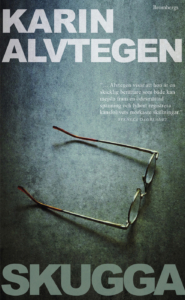Shadow
How much is glory and fame really worth, when counted in the suffering of the people closest to you? The death of the housekeeper of the fictive world-famous Nobel Prize laureate Axel Ragnerfeldt becomes the starting point of an investigation into the claustrophobic family ties, mysterious disappearances and dark secrets surrounding a man shrouded in myth.
With her fifth novel Shadow, Karin Alvtegen has achieved her darkest and most complex thriller to date, in which the disturbing truth of a sick family is gradually and mercilessly laid bare.
Prizes & nominations
Winner of the Danish Academy of Crime Writers´The Palle Rosenkrantz Award 2008 for Best Crime Novel in Denmark of the year.
Nominated for Duncan Laurie International Dagger Award 2009.
Nominated for the Swedish Academy of Crime Writers’ Award 2007 for Best Swedish Crime Novel of the Year.
What inspired you to write Shadow?
When does the first seed fall, and when does it start growing to then slowly branch out? Afterwards, it’s difficult to remember how it all began. How the characters matured in one’s mind to then come to life and correct themselves during the actual writing process. I remember two seeds from the other side of Shadow. The first one fell when I discovered I had been written into the Swedish national encyclopedia. Proud and happy, I scanned the entry.
Alvtegen, Karin, b. 1965, author, great niece of Astrid Lindgren. A. made her novel debut in 1998 with Guilt. With Missing (2000), which was awarded the Nordic Crime Writing Award The Glass Key, she established herself as one of the country’s foremost new crime writers, a position that she cemented with Betrayal (2003). A. writes intensely suspenseful psychological crime novels with terse character portraits, especially of women. Despite receiving massive attention in Sweden, she has attained her greatest successes outside the country; the books are translated into more than 20 languages. A. has also written screenplays for the TV series “Rederiet” among other productions.
One of the lines got me thinking. “…with terse character portraits, especially of women.” I immediately knew that the next novel would have men as the main characters, since the very driving force of my writing is to up the stakes, try to grow and above all, to challenge myself. Would I be able to create equally terse portraits of men? My fundamental way of viewing things has always been that if you scrape off the social and cultural heritage, I believe men and women deep down inside harbor the same driving forces and fears. I wanted to set out exploring this right away.
The other seed came from an entirely different direction. I have in my family one of the most admired and adored people ever in Sweden. My great aunt Astrid Lindgren. Astrid was a unique author, but also a unique person. She is and remains to me a great human role model. Those of us who had the privilege to know her, know that she is every bit as fantastic as rumor has it. The thought suddenly struck me, that what if it was precisely the other way around? What if a celebrated national icon, a Nobel laureate of literature whose novels were filled with thoughts on good and evil, was actually a real wretch? A man whose family was still forced to maintain the revered lifetime achievement and keep the aura of irreproachability intact?
From these two seeds, the idea for Shadow emerged and was mixed with other thoughts and concerns. Why do we humans have such a longing for numbing the brain with alcohol and other drugs? Which impact does the current media climate have on our children? What marks the outcome of our lives, and just how deeply are the traces from childhood etched into our minds? Who is really to blame when it all goes wrong? Is trying to save the world worth it if it is at the expense of one’s own family? And if so, what is the driving force?
The characters and the plot took shape during a year, after which it was time to start writing. One question was constantly present during the writing process: What is, in truth, genuine success?


